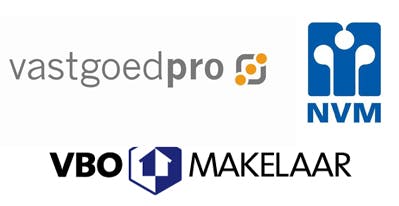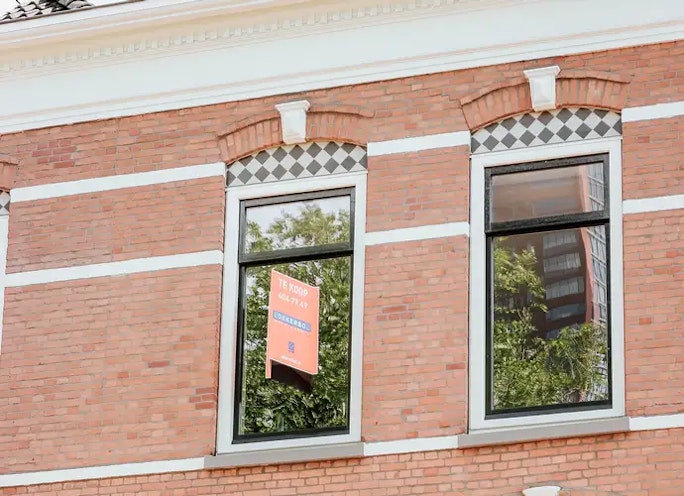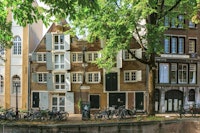Table of contents
How to sell a house in the Netherlands
This article will be of use if:
- You are not from the Netherlands, and
- You have a property to sell located in a Dutch city (Amsterdam, The Hague, Rotterdam, Utrecht, Eindhoven, etc.), and
- You could use some information on how selling property in the Netherlands works
This post consists of the following topics:
- The necessity of a Real estate agent in the Dutch market
- The things you have to consider when choosing a Real estate agent
- Where to look for a Real estate agent
- Commencement of the selling process
- The proposal
- Upon agreement: finalization
- Selling a house with a mortgage in the Netherlands
For your information: I am a Dutchman with many expat friends.
You might notice some uniquely structured sentences. Let's just say, my understanding of the Dutch real estate market far exceeds my English (feel free to send an e-mail to info@mijnverkoopmakelaar.nl if the error is too glaring to ignore).
I share this guide because I detest the fact that my fellow countrymen are exploiting expats, especially in the housing market.
Further down this page, you will find some information on what we do (Mijn Verkoopmakelaar) and how that could be helpful during this selling process.
Let's get started.
1. The necessity of a Real estate agent in the Dutch market
To employ a Real estate agent or not? That's the question.
Real estate agents are not that popular
Dutch people don't think much of Real estate agents. They have a pretty bad reputation. In part, their critique is justified. Not all agents add value, and it is extremely difficult to distinguish between honest and dishonest ones.
Not obligatory, but strongly recommended
The involvement of a Real estate agent is not mandatory. There is no rule or regulation that prohibits you from selling a property yourself.
Nevertheless, in almost 95% of the transactions, an agent is engaged on the selling side of the transaction. Sellers in the Netherlands contract a Real estate agent, because they provide:
- expertise in price evaluation and marketing
- support with viewings and legal obligations
- Trustworthiness in the eyes of potential buyers
Speaking as a Dutchman, I would suggest that the most prominent reason people involve a Real estate agent is 'Funda.nl'. You probably already know about this. Funda is the most popular* housing website for properties in the Netherlands. It is our equivalent to 'Rightmove', 'LeBonCoin' or 'Zillow'.
The link between Real estate agents and Funda is that only Real estate agents can list a property on the website. As an individual, you can't.** So without the involvement of an agent, your property won't have all the exposure it could have.
*Other less popular housing sites are Huispedia.nl and Pararius.nl. Huispedia.nl has the same listings as Funda. Pararius is mostly comprised of rental listings.
**Nifty fact: Funda.nl was founded and is still owned by one of the associations of Real estate agents. That's why they require the involvement of a Real estate agent. More on these associations below.
Just one agent, not multiple
In some countries, it is customary to contract multiple agents to encourage competition. In the Netherlands, that almost never happens. Agents get exclusivity on the deal. So, we are looking for one agent for the sale of your property.
Real estate agent in Dutch
To simplify all of this, here's a brief language lesson.
The Dutch word for realtor/estate agent is Makelaar or Verkoopmakelaar. 'Verkoop' means 'sell', so when you use 'Verkoopmakelaar', you are referring to the agent that works on the selling side of the transaction. If you use Makelaar, you are always safe ;).
Most Real estate agents in the Netherlands offer both buying services (aankoop) and selling services (verkoop). For clarity: they never work on both sides of the same deal, as that is not permitted.
- Multiple offers
- Verified agents
- Local experience
2. What to consider when choosing a Real estate agent
I will guide you on what to look for in Real estate agents, what to disregard, and how to select the right one.
Certifications or memberships
In the Netherlands, anyone can call themselves a Real estate agent. The title isn't protected (like a lawyer or doctor). Hence, it is crucial to check the certifications of an agent to ensure you don't end up with an inept fraud.
There are many badges and labels in this certification field that agents like to boast about. They aren't very helpful. That's why I'm going to skip all that and focus on the significant factor: their memberships.
Real estate agents are members of one of the three associations:

- NVM
- VBO
- Vastgoedpro
These memberships bring about quality checks and education for the agents. When choosing an agent, you need to look for one of these logos on their websites. This is a reliable indicator of quality and offers you some assurance of a good result.
To help you understand the differences between these associations, the best I can do is make an analogy with Dutch supermarkets (I hope you are well integrated enough to recognize these):
NVM = Albert Heijn
Most expensive, likely good quality.
VBO & VastgoedPRO = Jumbo
Slightly better priced, and comparable quality, but you have to search a bit.
Real estate agent fees
The most surprising thing about selling a house in the Netherlands is the fees of Real estate agents. The Netherlands ranks among the countries with the cheapest Real estate agents.
We have analyzed 3,000 proposals that agents submitted through our platform to potential sellers. The result: on average, Real estate agents charge 1.3% (Avg. EUR 4,000, depending on the value of your house), VAT included, for selling a property. That is much lower than in most other countries.
If the potential buyer also hired a Real estate agent, that doesn't change anything about the fee. You make your arrangements with your selling agent and the buyer makes their arrangements with their buying agent. These two are completely disconnected.
Selection process
Most Dutch people invite between 2 and 4 different Real estate agents to their property. The agents will walk through the property and will give you their estimate of the value of the house. They will also tell you how much they charge for their services and make a pitch on why they are the best choice, and the others are not.
Sometimes they also share with you what they think the asking price for the property should be. This could deliberately be higher or lower than the expected selling price. This could be part of the selling strategy an agent applies.
Based on their proposals, their marketing strategy, and their estimate of the selling price, you decide on whom you work with.
Local information about Real estate agents


















3. Where to search for a Real estate agent
Google, friends, funda, and a bit of shameless self-promotion.
Google makes sense, of course. The thing is that the search results are dominated by the most paying Real estate agents, instead of the best ones. Most of the time the agents that spend a lot on advertising, ran out of work because they are not the best.
Friends
Well, I don't have to explain this one: ask a friend or colleague. The hard thing is finding someone who has experience with multiple agents, so they can actually rate them properly.
Funda
Funda, remember, the housing website? They can provide you with a list of active agents in your city. Important to know: they favor the 'NVM'-Real estate agents, they don't base their selection on ratings or results.
Or:
This is the part where we can help you with a bit. We build a tool to help you with your search. You can fill in the form (postal code & street number) and upload a couple of pictures of the interior of the property. By doing this, Real estate agents in the area will get notified of your plans to sell and can leave you a response if they like to sell your house.

They provide you with their strategy, their fee, and their estimate of the achievable selling price (make sure the photos give a good and fair impression). In this way, you will save time and easily compare the offers of different Real estate agents. Our service is free and without obligation, so please take advantage of it.
Our website is not fully translated, but our (English-speaking) team is ready to help you through the whole thing in case you need help. You can reach us by phone or WhatsApp at 020 244 2790 or send an e-mail to info@mijnverkoopmakelaar.nl.
Find a Real estate agent in your area:
- Meerdere aanbiedingen
- Geverifieerde makelaars
- Lokale ervaring
4. Start of the selling process
After you have chosen 1 Real estate agent, that agent will provide you with a contract for their services. When you have signed that contract, the actual selling process begins.
Preparation
The Real estate agent will send a professional photographer to your property. During that visit, he or she will also make the floor map. Don't be under any illusions: most agents outsource the making of photos to one of the 3 companies that make almost all the photos on Funda.nl. Ensure your home looks immaculate when the photos are taken. In fact, most potential buyers select homes based on photos.
Here are some basic tips:
- Potential buyers prefer houses with lots of light, so white walls do well. Ensure the windows are clean. Put as few items in front of them as possible to maximize the amount of light.
- Make sure the house is tidy and clean. Put away all personal items. Give potential buyers a chance to imagine themselves living in your house. Another significant improvement is putting cables and cords out of sight.
- Make small repairs, such as a broken window, an old door handle, or a loose baseboard.
Further, the real estate agent will ask you to fill in some forms about the house: things you changed, problems like leakages, the absence of asbestos, etcetera. He will write, partly based on that, a marketing pitch about your place.
All that information combined will be published on Funda.nl and other channels to attract potential buyers.
Viewings
As a result, potential buyers will contact your real estate agent to plan viewings. A good real estate agent will combine the viewings as much as possible. This way, it is less time-consuming for you and the Real estate agent.
Your role during the viewings is limited to:
- Ensuring the property looks nice and tidy
- Leaving the apartment for the duration of the viewing
The length of the process
The necessary number of viewings will be around 5-15, depending on the location. On average, it takes 21 days (data from 2022) to get to a signed conditional buying agreement.
So, considering the whole process of preparation and the legal work: selling a property in the Netherlands will take around 2 months from start to finish.
Side note: the season in which you want to sell your home in the Netherlands may affect the length of the sales process. In general, people are less likely to be looking to buy a home in December. During the holidays everyone is busy with social affairs, and during the colder days people prefer to stay inside. As a result, it may take a little longer to sell your home during this period.
5. The offer
Conditionality of an offer
After a potential buyer has viewed the house 1 or 2 times and is interested in purchasing it, he or she will make an offer.
An offer will in 70% of the cases be conditional. The most commonly used conditions are:
- Technical inspection of the property by a building expert
- Successful mortgage application with a bank
A good Real estate agent will negotiate on your behalf to secure the best conditions and price.
Preliminary contract
Upon agreement, your Mijn Verkoopmakelaar will draft the preliminary contract. This contract is legally binding, and will contain the above mentioned conditions.
In Amsterdam, a notary will prepare this agreement. The reason for this custom is the complexity of Amsterdam real estate.
If everything is included in the agreement, you sign it.
6. Upon agreement: closing
Cooling-off period
By law, a buyer has 3 days to consider this contract, before it becomes binding.
Afterwards, the buyer gets 3 weeks (or whatever period is stated in the offer) to fulfill the conditions. When the mortgage is approved, the bank will provide a written bank guarantee for the purchase price.
Notary
After the conditions are met, both you and the buyer go to the notary. The notary will draft the deed of transfer. When both parties sign this document, your house is sold. The notary will transfer the selling price to you, minus the fee for your Mijn Verkoopmakelaar.
Taxation
The buyer is responsible for the transfer tax. Profits you make from the sale of the property are not taxed. More information about taxation can be found here:
7. Selling a house with a mortgage in the Netherlands
Selling your house with a mortgage on it
First of all, it is possible to sell your house with a mortgage on it. When the house is sold, the mortgage lender will then require you to pay off the full outstanding amount of the mortgage. We speak of surplus value or equity ("overwaarde" in Dutch) when the purchase price is higher than the residual debt. In that case the amount of the surplus value will be deposited into your back account.
If the property has not yielded enough to repay the amount, a residual debt ("restschuld" in Dutch) arises. You can pay off this debt with your own funds. If you are planning to take out a new mortgage in the Netherlands (for a new home), you can also co-finance the residual debt. In the case of residual debt, always contact the lender. If you do not, the bank may block the transfer of the property.
Selling your house and keeping your mortgage
Are you going to sell your house soon and move to a new home in the Netherlands? Many lenders allow you to take your existing mortgage, including the terms and conditions, with you to your new home. Such an arrangement is also referred to in Dutch as "verhuisregeling" or "meeneemregeling". This can, for example, be advantageous when you benefit from a low interest rate with your existing mortgage.
It is not the case that you can always take your mortgage with you. A mortgage is always linked to a particular house. When you sell your house, you must therefore make a new mortgage application. The lender will look at the value of your new home and examine whether you can borrow the amount with your current salary and assets. If this is the case, you can take your old mortgage with you under the same conditions.
This does not always mean that you keep exactly the same interest rate. The amount of interest depends on the ratio between the value of your home and the mortgage amount. Want to know more about this? Then ask your lender.
Chances are that your new house is more expensive, and your old mortgage is not enough to finance the house with. In that case, you can apply for an additional mortgage. You are usually required to take out this one with the same lender.
About Mijn Verkoopmakelaar
We hope this was helpful.
If you still need to choose a real estate agent, you can enter your postal code and answer the follow-up questions.
The agents in the area will examine your property and leave you an offer. They are aware they are in competition with other agents, so they will ensure their fee is competitive.
We monitor their performance to guarantee you a good result.
In summary:
- You receive multiple offers from agents in your area
- We have selected the agents based on their past results
- Using the service is free for you (agents share a small part of their commission)
- We keep your contact details private, so you won't receive unwanted calls
- Enter your postal code below
If you encounter any problems (with language, for example) while using the platform, feel free to contact us! We are here to assist you in English, albeit with a Dutch accent ;).
Compare local real estate agents:
Enter your postal code and house number:
- Multiple offers
- Verified agents
- Local experience
Veelgestelde vragen over het verkopen van onroerend goed in Nederland
Is a real estate agent necessary in the Netherlands?
The involvement of a real estate agent is not obligated by any rule or regulation. So you are free to sell a property all by yourself.
Nevertheless, in almost 95% of the transactions in the Netherlands a real estate agent is involved on the selling side of the transaction.
What is the average real estate agent commission in the Netherlands?
On average, real estate agents in the Netherlands charge a 1.15% (Avg. EUR 4,400) commission, VAT included (2025). This is much lower than in most other countries.
This fee is for the selling agent in the transaction. The agent on the buyer's side is paid by the buyer of the property.
The term 'NVM' stands for 'Nederlandse Vereniging van Makelaars', which translates to 'Dutch Association of Real Estate Agents'.
NVM is one of the two associations of real estate agents in the Netherlands. Through their membership, real estate agents receive education and quality checks. The other association is called Vastgoed Nederland.
What is the housing website Funda.nl?
Funda is by far the largest housing website in the Netherlands. Every buyer in the Netherlands starts their search here. Almost 90% of the properties for sale are included on the website.
As a consumer, you cannot upload your property on Funda yourself. Only Real estate agents may upload properties to the website.
Where can I find a real estate agent that doesn't treat me like an expat?
Hier kunt u uw postcode invullen. U vergelijkt vooraf gescreende Makelaars op hun prijzen, eerdere resultaten en hun strategie voor uw eigendom.








